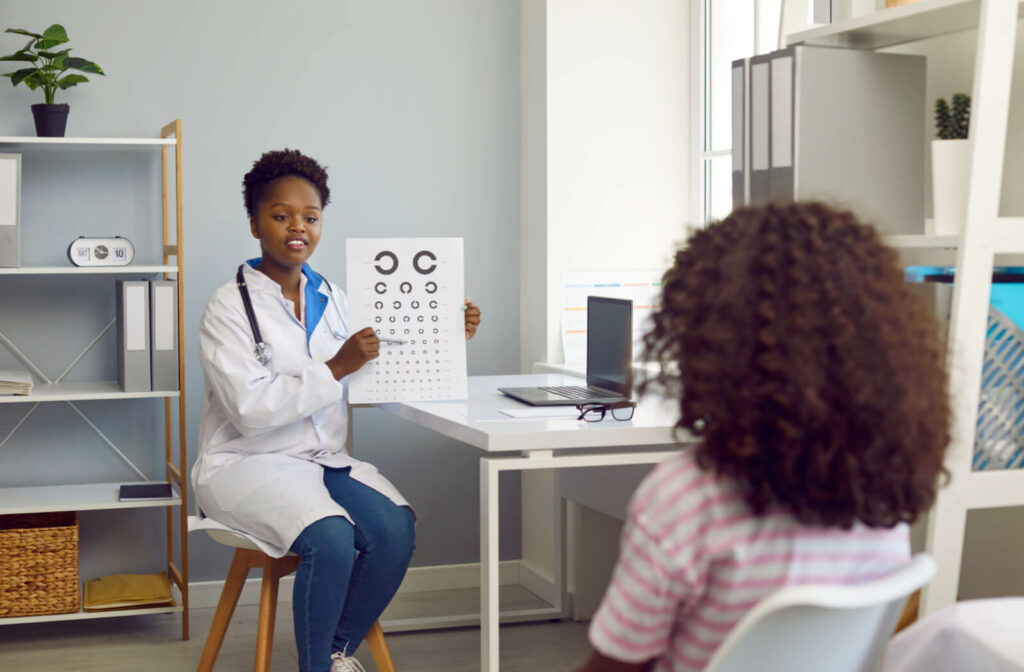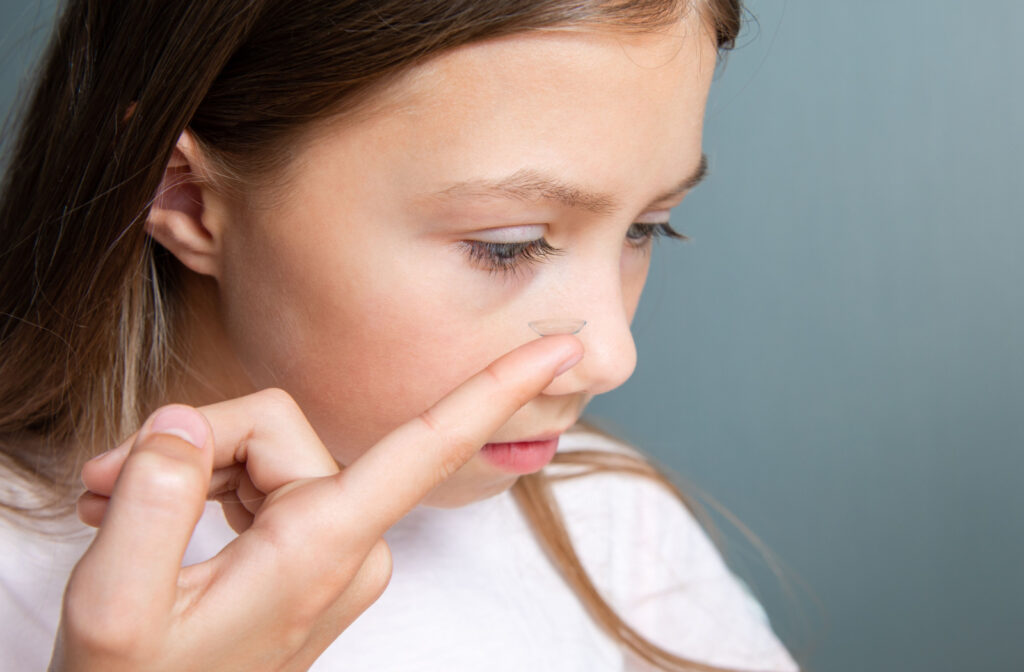If your child wears glasses, you may be wondering when they’re eligible to wear contact lenses. There is no age requirement for kids to wear contact lenses. However, most optometrists will suggest waiting until your child is 8–10 years old to start wearing contacts. This is because contact lens wear requires responsibility and proper hygiene to help prevent eye infections and other complications.
Benefits of Contact Lenses for Kids
When it comes to vision correction for kids, contact lenses can offer several benefits.
Enhanced Sports & Physical Activities
For active kids who participate in sports or other physical activities, glasses can be a hindrance. They may slip down the nose, fog up during intense moments, or even break. Contact lenses eliminate these concerns, providing clear and unobstructed vision, making it easier for kids to engage in sports and enjoy outdoor activities without any limitations.
Expanded Field of Vision
Unlike glasses, which limit peripheral vision, contact lenses allow for a full field of view. This is especially advantageous for kids who need to remain aware of their surroundings, whether it be during school or playtime. Contacts ensure that nothing is missed, enhancing overall situational awareness.
Greater Convenience
Contact lenses offer convenience for kids and parents alike. Once properly inserted, there is no need to worry about glasses slipping or adjusting throughout the day. Additionally, contacts don’t require constant cleaning like glasses do, making them a more hassle-free option for busy parents and active children.
Potential for Slowing Myopia Progression
Recent studies suggest that certain types of contact lenses, such as multifocal lenses, may help slow down the progression of myopia (nearsightedness) in children. This can be beneficial in managing the condition and potentially preventing it from worsening over time.
Promotes Responsibility & Independence
Wearing contact lenses requires kids to develop responsibility and independence when it comes to their eye health. They need to learn how to properly insert, remove, and care for their lenses, which can instill good habits and a sense of maturity at an early age.
Types of Contact Lenses for Kids
When it comes to contact lenses for kids, there are a few different types to consider based on their unique needs and lifestyles.
Soft Contact Lenses: Soft contact lenses are the most common type and are often recommended for kids. They are made from a flexible material that allows for a comfortable fit and easy adaptation. Soft lenses are available in various designs, including daily disposable, weekly or monthly replacement, and extended wear.
Daily Disposable Lenses: Daily disposable contact lenses are a popular choice for kids due to their convenience and hygiene benefits. With daily disposables, there is no need to worry about lens cleaning or storage. Each day, a fresh pair of lenses is used and then discarded, reducing the risk of eye infections.
Extended-Wear Lenses: Extended-wear contact lenses are designed to be worn continuously, even while sleeping. These lenses allow for greater freedom and flexibility, making them suitable for active kids who may forget to remove their lenses at night. However, it’s important to note that extended-wear lenses require regular check-ups with an eye care professional.
Rigid Gas Permeable Lenses: Rigid gas permeable (RGP) lenses, also known as hard lenses, are less commonly prescribed for children. They are made from a rigid plastic material that allows oxygen to pass through to the eyes. RGP lenses can provide excellent vision correction but may require a longer adjustment period compared to soft lenses.
Multifocal Lenses: Multifocal contact lenses are an option for kids who have both nearsightedness and farsightedness or who need vision correction for both distance and close-up tasks. These lenses have different zones for different visual needs, allowing kids to see clearly at varying distances without the need for reading glasses.
Orthokeratology (ortho-k): Orthokeratology (ortho-k) contacts are specialty contact lenses that your child wears while they sleep. During this time, the lens gently reshapes your child’s cornea in a way that can correct the refractive error caused by myopia. Then, when they remove them each morning, they enjoy clear, crisp vision all day long without using glasses or contact lenses.
It’s important to consult with an eye care professional to determine the most suitable type of contact lenses for your child. Factors such as the child’s prescription, eye health, and lifestyle will be taken into consideration to promote the best fit and comfort.
Contact Lens Care & Maintenance Tips for Kids
Taking care of contact lenses is essential for maintaining healthy eyes. Here are some tips to help kids properly care for their contact lenses.
Wash hands before handling. Before touching your contact lenses, teach your child to wash their hands with soap and water. This helps keep lenses clean and prevents any dirt or germs from getting into their eyes.
Follow the cleaning routine. Your eye care professional will provide instructions for your child on how to clean and disinfect their contact lenses.
Store contact lenses properly. When your child isn’t wearing their contact lenses, make sure they store them in a clean and dry lens case. Rinse the case with fresh solution after each use and let it air dry. Avoid using tap water or saliva to rinse your lenses or case—stick to the recommended solutions.
Avoid water exposure. Keep contact lenses away from water sources like the shower, swimming pool, or hot tub. Water can contain harmful bacteria or other microorganisms that can lead to eye infections.
Replace them as recommended. Contact lenses have an expiration date, depending on the type you’re using. Whether they are daily disposables or longer-lasting lenses, follow the recommended replacement schedule for your child’s contact lenses. Using expired or damaged lenses can cause discomfort and eye problems.
Don’t share lenses. It’s important to understand that lenses are personal items and should never be shared with anyone else. Sharing lenses increases the risk of spreading infections and can harm your child’s eyes.

Get Contact Lenses for Your Child
If you’re wondering if contact lenses could be a good option for your child, we’re here to help. Schedule a children’s eye exam with the team at Total Vision Pasadena by booking an appointment online or giving us a call. We look forward to hearing from you!




